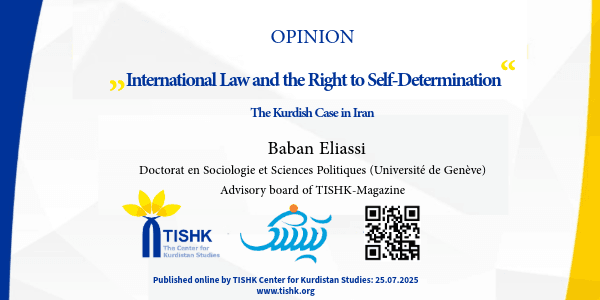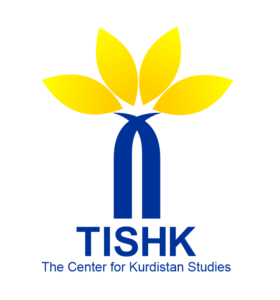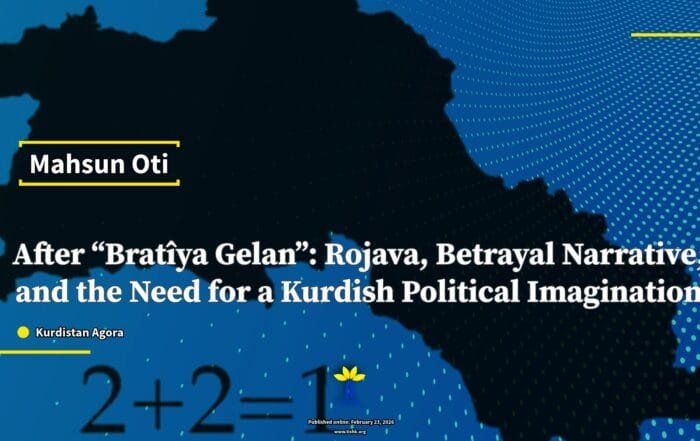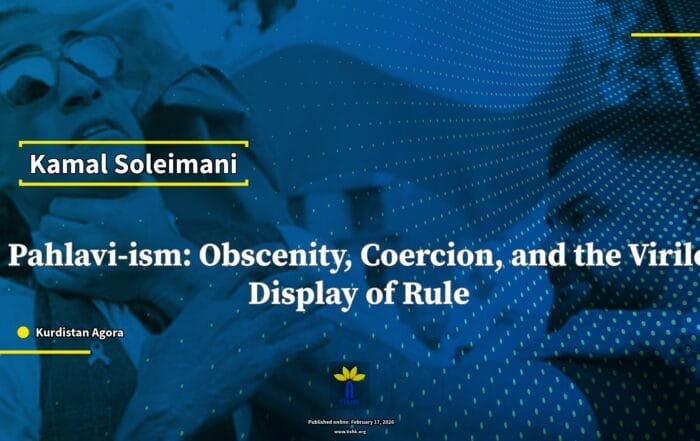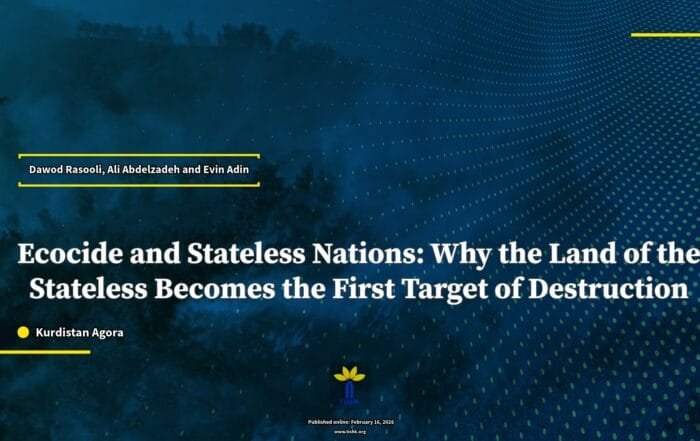OPINION
International Law and the Right to Self-Determination: The Kurdish Case in Iran
Published online by TISHK Center for Kurdistan Studies: 25.07.2025
DOI
Eliassi, Baban (2025): International Law and the Right to Self-Determination: The Kurdish Case in Iran. Kurdistan Agora. TISHK Center for Kurdistan Stdies.
Abstract
This article examines the right to self-determination under international law based on the case of the Kurds in Eastern Kurdistan (Iran). Although they are one of the largest stateless peoples, the Kurds in Iran are subject to systematic political, cultural, economic and religious oppression. The lingering effects of Ayatollah Khomeini’s 1979 fatwa (Islamic decree) against Kurdish autonomy and widespread discrimination justify the Kurds’ claim to an external right to self-determination. Referring to the legal framework and international precedents, such as the cases of Eritrea, South Sudan and Kosovo, this paper argues that international law allows for secession if internal self-determination is denied. The study also emphasises economic sovereignty as a key component of the Kurdish struggle for justice and autonomy.
.
Keywords: Self-determination, Kurdish rights, International law, External secession, Iran repression
International Law and the Right to Self-Determination: The Kurdish Case in Iran
Introduction
The principle of self-determination is a cornerstone of international law. It is enshrined in the United Nations Charter (1945), which in Article 1(2) affirms the aim:
“to develop friendly relations among nations based on respect for the principle of equal rights and self-determination of peoples.”
Furthermore, the International Covenant on Civil and Political Rights (ICCPR) and the International Covenant on Economic, Social and Cultural Rights (ICESCR) both begin with an identical Article 1(1), which proclaims:
“All peoples have the right of self-determination. By virtue of that right they freely determine their political status and freely pursue their economic, social and cultural development.”
Additionally, paragraph 3 of the same article adds:
“The States Parties to the present Covenant […] shall promote the realization of the right of self-determination, and shall respect that right.”
The Declaration on the Granting of Independence to Colonial Countries and Peoples (UNGA Resolution 1514, 1960) similarly affirms:
“All peoples have the right to self-determination; by virtue of that right they freely determine their political status and freely pursue their economic, social and cultural development.”
Evolution of the Principle of Self-Determination
Initially applied to decolonization, the principle has evolved to include both internal self-determination (e.g., autonomy or federalism) and, under specific circumstances, external self-determination (i.e., secession), particularly in cases of systematic oppression or gross human rights violations (Cassese, 1995). The CETIM brochure (Özden & Golay, 2018) further broadens this framework by stressing that the right to self-determination also includes permanent sovereignty over natural resources, economic justice, and cultural autonomy.
The Preamble of the United Nations Charter explicitly acknowledges the right of peoples to resist oppression, recognizing the legitimacy of such claims under extreme conditions (UN, 1945). Articles 1(2) and 55 of the Charter, alongside Article 1 of both the ICCPR and the ICESCR, enshrine self-determination as a fundamental collective right, obligating states to promote conditions for self-governance and equal participation (UN, 1966a; 1966b). UNGA Resolution 2625 (1970) clarifies that when a people is deprived of internal self-determination through systematic oppression, external self-determination may be invoked legitimately.
The Kurdish Situation in Iran
According to Amnesty International (2008), Kurds in Iran are estimated to number between 10 to 12 million, making them one of the largest stateless ethnic groups in the region. Yet, they face severe and systemic discrimination:
• Legal and Constitutional Discrimination: Although Article 15 of the Iranian Constitution allows for the use of regional languages in media and education, in practice, Kurdish language education is severely restricted. There is no official political representation or recognition of Kurdish autonomy.
• Religious Discrimination: Most Kurds in Iran are Sunni Muslims in a Shi’a-dominated theocracy, which severely limits their access to state resources and positions of power (ICG, 2017).
• Cultural Repression: Kurdish clothing, names, literature, and celebrations such as Newroz are frequently banned or suppressed, violating their cultural rights (UN Special Rapporteur on Cultural Rights, 2019).
• Political Repression: Kurdish political activists are disproportionately accused of crimes like “moharebeh” (enmity against God) and face imprisonment or execution (Amnesty International, 2021; HRW, 2020). Several reports show that the majority of political prisoners executed in Iran are Kurds (UN Human Rights Council, 2022).
• Economic Marginalization: Despite being resource-rich, Kurdish regions suffer from underdevelopment and state neglect (World Bank, 2018).
Following the 1979 Revolution, Ayatollah Khomeini issued a fatwa declaring a jihad against the Kurdish population, portraying their demand for autonomy as “fitna” (sedition). This decree resulted in bombings, military operations, and mass executions in Kurdistan (Gunter, 2011).
This fatwa still holds symbolic religious legitimacy, creating persistent anxiety among Kurds, who fear that current or future theocratic governments may invoke it again. This enduring religious decree weighs heavily on the collective psyche of the Kurdish population in Iran, generating a profound and lasting psychological impact. It fosters a climate of fear and insecurity, as Kurds live under the constant threat of renewed repression justified by religious authority, reinforcing feelings of vulnerability and marginalization. Like Saddam Hussein’s use of the Surah Al-Anfal to justify the 1988 genocide of Kurds in Iraq, religion in Iran has also been instrumentalized to justify systemic violence and cultural eradication.
International Examples Supporting External Self-Determination
Several cases of external self-determination support the Kurdish cause:
• Eritrea (1993): Achieved independence from Ethiopia after a UN-supervised referendum.
• South Sudan (2011): Gained statehood after systematic oppression and a peace agreement.
• Kosovo (2008): Declared independence, which the International Court of Justice (ICJ) ruled in 2010 did not violate international law.
These examples show that external self-determination is permissible when internal self-rule is denied and human rights are violated (ICJ, 2010; Arbour, 2008).
The African Commission on Human and Peoples’ Rights (2001) in Katangese Peoples’ Congress v. Zaire recognized that severe repression can legitimize external self-determination.
Economic Sovereignty and Resource Control
Economic sovereignty is integral to self-determination. Kurdish regions are rich in oil and gas, yet profits are centralized by the state. According to Özden & Golay (2018), economic exploitation without benefit-sharing violates the right to permanent sovereignty over natural resources.
Conclusion
The Kurdish people in Iran suffer political, cultural, economic, and religious oppression that, under international law, justify claims for external self-determination. The enduring impact of Khomeini’s fatwa, along with disproportionate executions and imprisonment of Kurds, reflect a strategy of state repression. The continued presence of this fatwa also leaves a profound psychological impact on the Kurdish population, fostering a climate of fear and insecurity. When internal self-determination is persistently denied, international law permits the pursuit of external self-determination—as recognized in several precedents. However, geopolitical constraints continue to shape the realization of this right.
References
- Amnesty International. (2008). Iran: Human rights and the Kurdish minority. Amnesty International Publications.
- Amnesty International. (2021). Iran: Executions and political repression.
- Arbour, L. (2008). Report of the Independent Expert on the Promotion of a Democratic and Equitable International Order. United Nations.
- Cassese, A. (1995). Self-Determination of Peoples: A Legal Reappraisal. Cambridge University Press.
- Gunter, M. M. (2011). The Kurds Ascending: The Evolving Solution to the Kurdish Problem in Iraq and Turkey. Palgrave Macmillan.
- Human Rights Watch (HRW). (2020). Iran: Repression of Kurdish Political Activists.
- International Court of Justice (ICJ). (2010). Accordance with International Law of the Unilateral Declaration of Independence in Respect of Kosovo. Advisory Opinion.
- International Crisis Group (ICG). (2017). Iran’s Kurdish Question.
- Özden, F., & Golay, C. (2018). Le droit des peuples à l’autodétermination, à la souveraineté permanente sur leurs ressources naturelles et à la justice économique. CETIM.
- United Nations (UN). (1945). Charter of the United Nations.
- United Nations (UN). (1966a). International Covenant on Civil and Political Rights.
- United Nations (UN). (1966b). International Covenant on Economic, Social and Cultural Rights.
- United Nations General Assembly (UNGA). (1960). Resolution 1514 (XV) - Declaration on the Granting of Independence to Colonial Countries and Peoples.
- United Nations General Assembly (UNGA). (1970). Resolution 2625 (XXV) - Declaration on Principles of International Law concerning Friendly Relations and Co-operation among States.
- United Nations Human Rights Council. (2022). Report on the Situation of Political Prisoners in Iran.
- United Nations Special Rapporteur on Cultural Rights. (2019). Report on the Cultural Rights of Minorities.
- World Bank. (2018). Iran: Economic Overview and Regional Disparities.
Other Research
After “Bratîya Gelan”: Rojava, Betrayal Narrative, and the Need for a Kurdish Political Imagination
Mahsun Oti PhD student in Anthropology at Rutgers University, USA. Published online by TISHK Center for Kurdistan Studies: Bonn, Germany: 23 February 2026 The Point Whether one interprets this as [...]
Pahlavi-ism: Obscenity, Coercion, and the Virile Display of Rule
Kamal Soleimani Published online by TISHK Center for Kurdistan Studies: Bonn, Germany: 17 February 2026 Abstract Neo-Pahlavism has re-emerged not as a coherent doctrine but as a contemporary regime of [...]
Ecocide and Stateless Nations: Why the Land of the Stateless Becomes the First Target of Destruction
Dawod Rasooli (PhD of Soil & Water Silences; TISHK Center for Kurdistan Studies, Germany), Ali Abdelzadeh (Associate Professor in Political Science at Dalarna University, Sweden) and Evin Adin (Soil Fertility Researcher; TISHK Center for [...]

